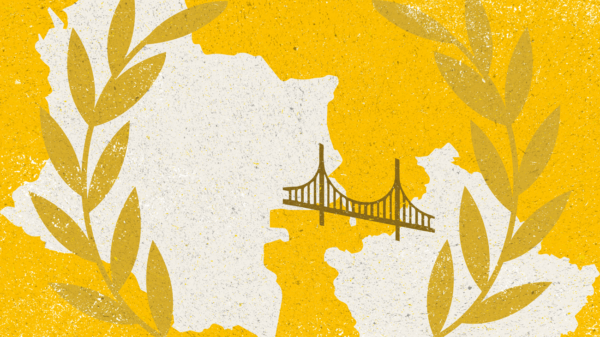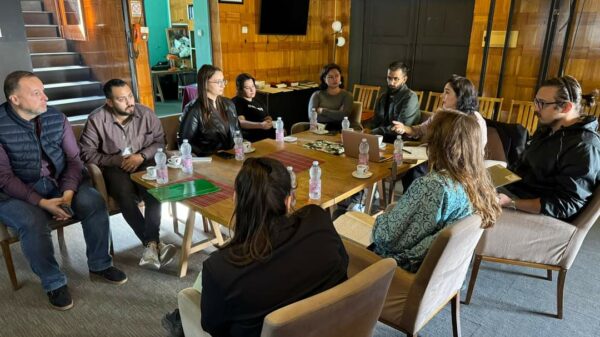*Prepared by: Fitim Gashi
The Western Balkans continues to face malicious interference from outside, increasingly manifested through sophisticated disinformation campaigns, designed to manipulate public opinion and undermine democratic institutions. The use of information disorders including disinformation, misinformation and other forms by malicious actors has become a tool to foment division and polarize society.
The production of disinformation is not limited to local and regional actors. External powers, especially those with authoritarian tendencies, see the Balkans as a geopolitical chessboard, where disinformation has lower costs but greater impact on achieving strategic goals.
This risk is particularly high in Kosovo due to the unresolved conflict with Serbia. Kosovo is also partially recognized internationally and used by countries such as China and Russia to advance their agendas.
To tackle this negative phenomenon, in December 2021, Sbunker became part of the network of media and investigative journalists from the six countries of the Western Balkans as part of the "Western Balkans Anti-Disinformation Hub" project, which aims to verify facts and unmask false articles, so the public is accurately informed.
Following Sbunker's three-year monitoring, it can be concluded that the main sources of disinformation are portals that distribute fake news, including the translation of foreign news with disinformation content. Some online portals are linked to political parties and interest groups, which are used particularly during elections .
Research into the information environment in Kosovo by NDI found that there is a strong local market for disinformation. Interviews with key actors from political parties, civil society, the media, the technology industry and government revealed that political actors from across the spectrum use news portals as disinformation sites and regularly produce disinformation, trying to achieve short-term political gains and sway beliefs of the electorate.
Internationally, disinformation comes mainly from Serbia, including pro-government media and Serbian state officials. They are widely broadcast in local media in the north of the country. Disinformation from Russia and China is also present, which is distributed through pro-government channels, including state news agencies, which mainly target the Serbian community in Kosovo.
The aim of this report is to highlight how information distortions are used to negatively influence public discourse in Kosovo and the region, by focusing on the interaction between media, technology and geopolitical developments. In particular, this report will focus on the type of disinformation in Kosovo, as well as disinformation from foreign countries.
Synthetic disinformation: A new and sophisticated technological trend for the spread of deep fakes
The immense technological leaps in the field of Artificial Intelligence (AI) have opened a golden opportunity for malicious actors to create "deep fakes", thereby increasing their ability to deceive and manipulate public discourse. The implications for Kosovo are multiple, as these technologies are misused to distort historical narratives, fabricate events and situations in times of tension, which have great potential for inciting violence or unrest.
Synthetic disinformation refers to content that is produced by AI to create narratives through audio-visual images that appear realistic, but are entirely fabricated.
As discussed in the article, “Artificial Intelligence Hallucinations and Synthetic Disinformation,” AI-driven disinformation presents a challenge due to its ability to mimic authentic media content, making it increasingly difficult for the public to distinguish truth from lies, while simultaneously increasing the likelihood of greater manipulation.
A typical example of this is an audio recording published in 2023 through which it was hinted that, in a conversation between the Prime Minister of Kosovo, Albin Kurti, and the US Ambassador to Kosovo, Jeffrey Hovenier, the persecution of Serbs in Kosovo was discussed. At the top of the article, which received thousands of views and distribution on social networks, it was written that in the audio-recording, you can hear the conversation in which the ambassador complains that the Serbs in the north are being subjected to violations of human rights. Meanwhile, it alludes that the Prime Minister of Kosovo told the ambassador that, "we will continue to arrest the Serbs in the north of Kosovo and that we do not care if they are guilty or not".
But the article was fake and the voices of the two protagonists were manipulated through AI techniques. This manipulative audio was released at a time when tensions in the north were high and escalated to clashes between violent protesters, on one side, and KFOR and the Kosovo Police, on the other.
Using disinformation to discredit public figures
In Kosovo, a lot of misinformation is also created with the aim of discrediting public figures. This is done by manipulating facts and distorting the truth to give more credibility to the news.
A typical example of this is the Frontliner platform led by Vudi Xhymshiti, a self-proclaimed journalist who produces sensational and fake news with the aim of denigrating the reputation of individuals, organizations and institutions that criticize the work of the Government of Kosovo led by Prime Minister Albin Kurti.
Xhymshiti falsely claimed that Escobar had secret financial ties to Serbia, spreading information intended to compromise the integrity of a senior US diplomatic figure. These allegations were denied by the US State Department.
These claims were intended to tarnish Escobar's reputation and undermine his credibility in the dialogue process between Kosovo and Serbia.
In another article, Xhymshiti misinformed that Escobar is being dismissed from office due to his family's financial ties with Serbian institutions.
But Escobar denied all these accusations, calling them lies.
This becomes even more alarming when suspicions are raised about the involvement of the state apparatus in the fabrication of false information, such as the one about the dismissal of Escobar. Although the Kosovo government denied it, US Deputy/Secretary Escobar said that the misinformation about his possible dismissal from the US State Department was published after he had had talks with the governments of the region, including that of Kosovo, regarding his transition to a new appointment following the conclusion of his mandate.
The spread of misinformation through conspiracy theories
A disturbing growing trend of late is the provision of television space to individuals who peddle conspiracy theories that have no basis in fact. Among other things, there were claims that " NATO will invade Serbia " or that " Camp Bondsteel will be moved to Nis ".
The conspiracy created through a satirical video that has been circulating since 2022 in the United States of America, that President Joe Biden is dead and that the United States is being led by his brother, made it to Kosovo also. Despite being labelled as a lie by fact checkers in the USA, the Kosovar media re-introduced it back through local conspiracy theorists.
During the COVID-19 pandemic, one of the most popular theories in Kosovo was that the vaccines were a tool to control the global population and that they contained secret microchips to monitor people. This theory circulated in many countries of the world, including Kosovo, where it was widely spread through social networks.
Conspiracy theorists use natural disasters when citizens' interest in consuming information is high, thus casting doubt on causes and motives. After the February 6, 2023 earthquake in Turkey, Albanian conspiracy theorist Alfred Cako said that the earthquake may have been caused by the so-called High Frequency Active Auroral Research Program, known as HAARP. Without referring to any official source or scientific data, Cako claimed that the earthquake was caused by human hands with the intention of revenge.
Conspiracy theories are hypotheses or beliefs that suggest that certain situations or developments are the result of a conspiracy by a powerful and secretive group. Such theories are usually not based on verified facts, but on speculation and misinformation that can be harmful and are intended to spread fear and create mistrust.
External influences: Russian hybrid warfare
Kosovo is not immune to Russia's hybrid war either, which intensified after it launched a large-scale attack on Ukraine. Parallel to the invasion of Ukraine, Russia aggressively engaged in spreading false information about Kosovo and the Balkan region.
Russian propaganda mainly targets the Serbian community in Kosovo with the aim of deepening ethnic polarization. This consists in spreading false narratives about the treatment of Serbs in Kosovo and portraying the Albanian majority as hostile to them.
Russian disinformation campaigns target various aspects, including historical events, politics and ethnic divisions.
As part of these attempts, Russian officials had, in one case, compared the massacre of Bucha in Ukraine with the Massacre of Recak in Kosovo, with the claim that both were fictions. The head of Russian diplomacy, Sergey Lavrov, raised allegations that the massacred bodies were not civilians, but that their clothes had been changed so as to look like civilians.
In addition to justifying the invasion of Ukraine through the analogy drawn with the case of Kosovo, Russian officials from Putin to Foreign Minister Lavrov misinformed that mercenaries from Kosovo are fighting in Ukraine, even though this claim was never proven with facts.
There are various examples of similarities between narratives and disinformation in Ukraine and the Balkans, which have been identified by fact-checkers. In Kiev, one of the main teams of fact-checkers is "VoxCheck", which has monitored 93 popular media in six European countries: Germany, Italy, the Czech Republic, Slovakia, Poland and Ukraine. According to them, most of the news is related to allegations of foreign mercenaries in the Ukrainian war.
But the list of countries affected by this narrative is longer. This narrative has its source in the Ministry of Foreign Affairs of Russia, which, along with other countries on the list, also included Kosovo and Albania. Although access to the Russian media for the Kosovar public is prohibited, this list had prompted official reactions from Kosovo. Government officials have stated that no Kosovar citizen is fighting in Ukraine and that these are Russia's claims to justify the war in Ukraine.
This misinformation was widely spread in the media controlled by Serbia and Russia, which have an unhindered reach in Kosovo as well. Kosovo institutions took actions in the area of security and imposed sanctions on Russia, including the sphere of information, by blocking some Russian channels.
External influences: Misinformation from Serbia
In line with the Russian narrative about mercenaries, Serbian officials went even further, claiming that groups of Chechens and Circassians were allegedly stationed in Kosovo, with the aim of killing armed Serbs in the north of the country. The claim was made by the president of Serbia, Aleksandar Vucic, and made it on the front pages of Serbian media, which were also distributed in the areas populated by Serbian majority.
Another constant narrative is the claim that the Kosovo government aims to ethnically cleanse the Serbs from Kosovo. This sprang again following the decisions of the government of Kosovo, such as the one regarding reciprocity in license plates and identity cards, but also the frequent actions of the Kosovo authorities to close illegal institutions in the north, inhabited mainly by Serbs, as well as the arrest of suspects for involvement in crime.
Through pro-government media, Serbia went on a weeks-long misinformation campaign that Serbs will have their personal documents confiscated at the border, an action that, according to them would, precede their final expulsion from Kosovo.
However, according to the decision of the government of Kosovo, this had nothing to do with deportation, but about the placement of stickers on Serbian license plates, a practice that Serbia has applied with the citizens of Kosovo for more than a decade.
The discourse and narratives that Vucic and the media controlled by him have built over the years in relation to Kosovo were repeated even following the September 24 terrorist attack in Banjska, Zveçan, where a sergeant of the Kosovo Police was killed . Vucic tried to justify the attack by saying that: " we have been warning Brussels and Washington everyday that the attack was a consequence of the dissatisfaction of the local Serbs with the decisions of the Kosovo government".
There was no lacking of misinformation in this situation either, with publications mainly in online media and social networks, aimed at manipulating public opinion in Kosovo and Serbia.
A lot of misinformation circulated about the number of members killed on the side of the terrorist group. Numerous portals in the Albanian language published unverified figures that up to 15 members of the group were allegedly killed. But these news were debunked by state authorities, which confirmed at the end of the counter-terrorism action that three members of the group were killed. Further misinformation took place through photographs published from other areas of the conflict, alleging they were the attackers killed in the north of Kosovo.
Following the publication of the video on the day of the attack, which showed Milan Radojcic as the leader of the terrorist group near the Monastery of Banjska, the Foreign Minister of Serbia, Ivica Dacic, said that the video is not from the day of the attack. After the authenticity of the video was confirmed, he admitted that he was wrong in his statements, arguing that someone sent it to him and that he did not verify it.
External influences: Chinese propaganda
Another malicious actor is China. China uses media channels and social networking platforms to spread false information with the aim of damaging Kosovo's image and strengthening pro-Chinese narratives. This also includes false claims about the activities of independent media organizations such as Sbunker, which runs on grants from the West.
The most recent target was the National Endowment for Democracy (NED), which was baselessly accused by the Chinese authorities of "overthrowing governments and fomenting divisions in various countries of the world", including Kosovo.
The report published on August 9 by the Ministry of Foreign Affairs of the People's Republic of China, entitled " National Endowment for Democracy: What it is and what it does ", raises unfounded claims that NED has long funded NGOs in Kosovo, specifically mentioning Sbunker as well, in order to incite tensions between the Serbian and Kosovar governments, referring to the latter as " temporary self-governing institutions in Kosovo".
The Chinese government claims that NED acts on directives from the US government to interfere in the internal affairs of other countries under the guise of promoting democracy. This narrative is not only false, but also misjudges the work of NED and its role in the Western Balkans region, which has a long history of supporting democratic institutions and civil society organizations.
In the absence of formal recognition, relations between China and Kosovo remain cold. But, despite China disputing Kosovo’s statehood, there is no lack of interaction. The largest Asian state has tried to extend its influence through its main partner in the Western Balkans, Serbia. Although not to the same extent as with the Serbian state and other countries in the region, where cooperation extends to the sectors of economy, technology and culture, the communist state is present in Kosovo mainly through technological equipment.
Chinese tech companies have grown rapidly in recent years, thanks to cheap but capable surveillance, storage and data processing. This technological explosion has raised concerns for the security of citizens due to the risk of their data falling into the hands of parties with destructive intentions.
How do we continue the fight against disinformation?
At a time when disinformation and distortion of truth have become common tools for malicious actors, it is vital that the state and public institutions take steps to protect the integrity of information and equip the public with the right media literacy, in order to be able to identify foreign manipulations.
The fight against disinformation requires an integrated approach, where each sector of society plays an important role in building the defense system against malicious influences. Kosovo does not have any specific legislation or regulation dealing with disinformation, beyond standard defamation laws.
One of the most effective ways to combat misinformation is through media education. By equipping citizens with the necessary knowledge to critically evaluate the sources from which they receive information, adequate protection against malicious influences can be attained.
In the case of Kosovo, it is imperative that media education be included in school programs from an early age. This would make it possible to create a new generation of citizens who understand and acknowledge the complex informational ecosystem.
The media and civil society organizations can serve as independent watchdogs, debunking propaganda and ensuring that the public has access to accurate and reliable information.
In this context, regional and international networking is indispensable. Only through the sharing of resources, strategies and best practices can the common threats that endanger not only Kosovo, but also the region be successfully addressed.
Consequently, an important step towards the promotion of accurate information globally and the construction of a sustainable information ecosystem in Kosovo consists in signing of the agreement of understanding between the USA and Kosovo, against the manipulation of information by foreign countries.
Awareness campaigns are also important to educate citizens about the dangers of disinformation. Different demographic groups including the young, the elderly and rural communities, which are often more susceptible to misinformation, should be targeted.
While regulation of online content and social media are important tools to address information disorders, it is essential that these measures are implemented in a way that respects media independence, human rights and freedom of expression. The balance between the fight against disinformation and the preservation of these freedoms is essential for a healthy democracy.
This report was prepared by Sbunker as part of the project “Strengthening Community Resilience against Disinformation” supported through the Digital Activism Program by TechSoup Global.




























































